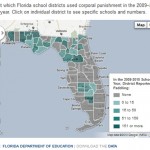Why Florida Schools Want the Right to Paddle Misbehaving Students

Sarah / Gonzalez
The wooden paddle sits on the principal's desk at Sneads High School in Jackson County, Fla.
Spanking in school may seem like a relic of the past.
But in Florida, students from preschoolers to high school seniors are still being paddled by teachers and principals.
In parts of the state, mostly in the rural north, getting spanked at school, on your butt, with a wooden or fiberglass board, is just part of being a misbehaving student.
“I been getting them since about first grade,” said Lucas Mixon, now a junior at Holmes County High School in Bonifay, Fla.
“It’s just regular. They tell you to put your hands up on the desk and how many swats you’re going to get.”
Miami Valedictorian Meets with U.S. Senator After Deportation Order
The North Miami High School valedictorian who was threatened with deportation, Daniela Pelaez, is in the capital today.

Daniela Pelaez met with U.S. Sens. Bill Nelson, Marco Rubio and U.S. Rep. Frederica Wilson, D-Miami, among others.
More than 2,600 students, teachers and community members protested after an immigration judge decided to deport Pelaez. Continue Reading
Explaining Why More Florida Schools Will Earn Failing Grades
 Florida is getting stricter about the way it grades schools, and the proposed rules could mean a spike in the number of elementary, middle and high schools earning ‘F’ grades.
Florida is getting stricter about the way it grades schools, and the proposed rules could mean a spike in the number of elementary, middle and high schools earning ‘F’ grades.
The state Board of Education is considering a new grading system next week. Before that meeting, state education officials made projections on the number of F grades Florida schools would earn under the new grading system.
Here’s the breakdown of Florida’s largest school districts:
- In Duval County the number of F schools would go from 6 to 29.
- In Broward County the number of F schools would go from 5 to 27.
- In Hillsborough County the number of F schools would go from 2 to 18.
- In Miami-Dade County the number of F schools would go from 5 to 50. Continue Reading
Some Students With Incarcerated, Absent Parents Pay Higher Tuition
A bill seen mostly as an effort to give immigrant families cheaper college tuition rates has died in the Florida Senate Judiciary Committee.
The failed SB 106 would have allowed undocumented students and legal Florida residents with undocumented parents to pay in-state tuition rates, which are up to three times less expensive than the out-of-state rates they currently pay.
But the current law doesn’t only keep immigrant families from accessing the cheaper rates. It can also affect Florida-born students with Florida-born parents who are incarcerated, deceased or absent.
“It does not just impact Hispanics or Latinos or Florida’s immigrant community which includes Haitians and Jamaicans, it also includes your typical American,” said Desmond Meade, president of the Florida Rights Restoration Coalition, which works on civil rights issues of convicted felons who have served their sentences.
“Seven out of 10 households are just one paycheck away from being homeless, and so you can have a situation where the child is separated from the parent, the parent is incarcerated, the parent dies, and what is that young person supposed to do? Making them pay higher tuition because their parents aren’t around is not fair.” Continue Reading
Why Poverty Is Not Included in the Mathematical Equation for Teacher Merit Pay

Charles Trainor Jr. / Miami Herald
Advanced calculus teacher, Orlando Sarduy writes out the mathematical equation that will help grade teachers and determine how much they get paid. The formula considers 10 factors that influence how well a student does in school, but student poverty is not one of those factors.
Florida teachers will soon be judged on how much they improve student scores on a standardized test. Part of their pay is going to be based on a new formula created by the state.
But the formula doesn’t take into account what researchers say is one of the strongest indicators of student success: poverty.
The equation predicts what students should score on the state’s standardized exam, the FCAT, and then grades teachers if their students score above or below that predicted test score.
By 2014, all Florida schools will have to use the formula to evaluate teacher performance.
Miami-Dade County Superintendent Alberto Carvalho says leaving out poverty is a problem. He says poverty isn’t an excuse for low student performance, but it also can’t be ignored.
“To completely eliminate it off the table of discussion I think is quite frankly, reckless, disingenuous and insulting to poor people,” Carvalho said.
Inside the Mathematical Equation for Teacher Merit Pay
Miami Herald reporter Laura Isensee contributed to this report. Read her story on Florida’s merit pay formula here.
School has always been about grading students. But now 24 states are starting to grade teachers.
Florida is using a mathematical formula to calculate how well teachers are doing their jobs. The grade it spits out will help determine how much a teacher gets paid and whether that teacher can keep his or her job.
But the formula is so complex even an advanced calculus teacher and former college math major can’t understand how it works.

CHARLES TRAINOR JR. / Miami Herald
Advanced calculus high school teacher, Orlando Sarduy, writes out the formula that will grade and help determine the pay of Florida teachers. Even for a college math major like him, the formula is too confusing to understand. He calls it a "mathematical experiment."
Coral Reef High School teacher Orlando Sarduy says just reading the formula is difficult for him.
StateImpact Florida and the Miami Herald partnered up to deconstruct the equation and try to figure out what’s going on here. We asked statisticians and policymakers how the formula works. The answer we got: No lay person, teacher or reporter can understand it. So just trust us.
“I would really challenge any sort of decision maker to look at [the formula] and explain it,” Sarduy said. “I understand just the basics, but this is really the technical nitty-gritty of what’s going on, and to me it looks the same as it would to a lay person, like ‘what’s going on here?” Continue Reading
Should Students Repeat Third-Grade if They Can’t Read Well?
Florida has been holding back third graders who fail the state reading exam since 2003. Now Colorado, Iowa, New Mexico and Tennessee are trying to mirror Florida’s policy, according to The Wall Street Journal.
But is Florida’s policy a good one?
Jaryn Emhof, with the Foundation for Florida’s Future said third grade is the most important year for new readers.
“Because up to third grade you’re learning to read, but from fourth grade on you’re reading to learn.” So Emhof said students can continue to fall behind in all the other subjects if they are not good readers.
Since the law passed under Gov. Jeb Bush, fourth grade reading scores in Florida went from ranking second from the bottom nationally in 1999 to among the top ten today. But eight grade reading scores are still low.
“That’s an area Florida is still working on,” Emhof said. Continue Reading
Fla. Senate Recommends USF Get the Biggest Budget Cut
The University of South Florida is holding an emergency meeting today after a recommendation to disproportionately cut USF’s budget, compared to other state Universities.
Of the $400 million recommended to be cut from the entire state university system, $79 million would come from USF, according to the Tampa Bay Times.
The budget recommendation comes after Polytechnic has been trying to split from USF to become its own, independent University.
Another $25 million would be held in “contingency,” pending USF’s cooperation in immediately severing its branch campus in Lakeland. That move, pushed hard by Senate budget chairman JD Alexander, would require giving the new “Florida Polytechnic University” all USF Polytechnic’s money, property, foundation dollars and more with USF retaining all USF Poly’s faculty and staff. Absorbing all those people is expected to cost another $16 million to the university, said USF Provost Ralph Wilcox. Continue Reading
Students Stage a Sit-In to Fight for College Tuition Equity

Florida Immigrant Coalition
Students and immigrant rights activists wear graduation caps during a sit-in at Rep. Carlos Lopez Cantera's office in Tallahassee. They're asking the House Majority Leader to push forward a bill in the Florida Legislature that would grant college tuition equity for all Florida students.
Students with the activist group We Are Florida have staged a quiet sit-in at Rep. Carlos Lopez Cantera’s office in Tallahassee today, asking him to support HB 81, a bill that would grant in-state tuition for all youth living in Florida regardless of their immigration status or the immigration status of their parents.
As StateImpact Florida has reported, Florida-born U.S. citizens have to pay the out-of-state college tuition rate if they have undocumented parents, or if their Florida-born parents decide to leave the state. Until a Florida college student is 25 years old, or financially dependent according to tax forms, the state looks at the residency of a students’ parents to determine tuition costs. The out-of-state tuition rate is up to three times higher than the in-state tuition rate.
We Are Florida said this about Rep. Cantera:
As member of the Hispanic Caucus we depend on him to be the voice for immigrants across Florida. As House Majority Leader he has the power to move HB 81. The future of Florida is in his hands!
The delegations will stay in his office until 5pm or until he agrees to support.


